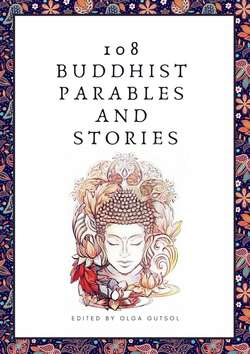Читать книгу 108 Buddhist Parables and Stories - Olga Gutsol - Страница 17
На сайте Литреса книга снята с продажи.
15. RAHULA, THE SON
ОглавлениеWhen the Buddha returned to Kapilavatthu, Yasodhara took little Rahula to listen to the Buddha’s preaching. When they arrived, she said to her son, “This is your father, Rahula. Go and ask him for your inheritance.” The child walked through the assembly and stood before the Buddha, saying without fear and with much affection, “How pleasant is your shadow, O Monk.” When the talk had finished and the Buddha left, Rahula followed him, and as they walked along Rahula said, “Give me my inheritance, O Monk.”
The Buddha had nothing to give except the doctrine of Dharma, so he turned to Sariputta and said, “My son asks for his inheritance. I cannot give him perishable treasures that will bring cares and sorrows, but I can give him the inheritance of a holy life, which is a treasure that will not perish.”
When King Suddhodana heard that Rahula had joined the brotherhood of monks he was grieved. He had lost his sons, Siddhattha and Nanda, he had lost Devadatta, his nephew and no he had lost his only grandson. And the Blessed One promised that from that time forward he would not ordain any minor without the consent of his parents or guardians.
As if to make up for the seven years the boy was without a father, the Buddha took great interest in Rahula’s moral and spiritual education, teaching him many times himself. Rahula was an eager and attentive student and it is said that each morning as he awoke, he would take a handful of sand and say, “May I have today, as many words of counsel from my teacher as there are here grains of sand.” As a result of this enthusiasm, the Buddha said that of all his disciples Rahula had the most zeal for training.
The conduct of Rahula, however, was not always marked by a love of truth, and so the Blessed One ordered his son to bring him a basin of water and to wash his feet, to which Rahula obeyed.
When Rahula had washed his father’s feet, the Blessed One asked him, saying, “Is the water now fit for drinking?”
“No, Master” replied Rahula, “the water is unclean.”
Said the Blessed One, “Now consider your own case, Rahula. You are unable to guard your tongue from untruth and thus your mind is unclean.”
And when the water had been poured away, the Buddha asked again, saying, “Is this vessel now fit for holding water to drink?”
“No, Master” replied Rahula, “the vessel, too, has become unclean.”
“Now consider your own case, Rahula. Are you fit for any high purpose when you have become unclean like the vessel?”
Then the Blessed One lifting up the empty basin and whirling it round asked Rahula, saying, “Are you not afraid that it might fall and break?”
“No, Master” replied Rahula, “it is cheap, its loss will not amount to much.”
“Now consider your own case, Rahula. Your mind is whirled about in endless thoughts and your body is made of the same substance as other material things that will crumble to dust. There is no loss if it to be broken.”
The Buddha then impressed upon his son the importance of speaking the truth, saying, “Rahula, for anyone who has no shame at intentional lying, there is no evil that that person cannot do. Therefore, you should train yourself to never tell a lie.””
Having explained what has to be done, the Buddha went on to explain to Rahula how it could be done.
“Rahula, what is the purpose of a mirror?”
“The purpose of a mirror is to look at yourself.”
“Even so, Rahula, one should act with body, speech or mind only after first looking at oneself. Before acting with body, speech or mind, one should think, What I am about to do, will it harm me or others?” If you can answer, Yes, it will,” then you should not act. But if you can answer, “No, it will not,” then you should act. You should reflect in the same way while acting and after having acted. Therefore, Rahula, you should train yourself to act only after repeatedly looking at and reflecting on yourself.”
Rahula was trained in the Ten Precepts and monastic discipline and when he was eighteen, the Buddha decided that he was ready for meditation. The Blessed One then gave Rahula an advice on how to practice, saying, “Develop a mind that is like the four great elements (earth, water, fire and air) because if you do this, pleasant or unpleasant sensory impressions that have arisen and taken hold of the mind will not persist. Develop love, Rahula, for by doing so you will get rid of ill-will. Develop compassion, for by doing so you will get rid of violence. Develop sympathetic joy, for by doing so you will get rid of animosity. Develop equanimity, for by doing so you will get rid of uncontrolled reaction. Develop the perception of the foul, for by doing so you will get rid of attachment. Develop the perception of impermanence, for by doing so you will get rid of the conceit of selfhood. Develop mindfulness of breathing for it is of great benefit and advantage.”
Following his father’s advice and guidance on meditation, Rahula finally attained enlightenment. He was eighteen at the time. After that everyone always referred to him as Rahulabhadda (Rahula the Lucky).
